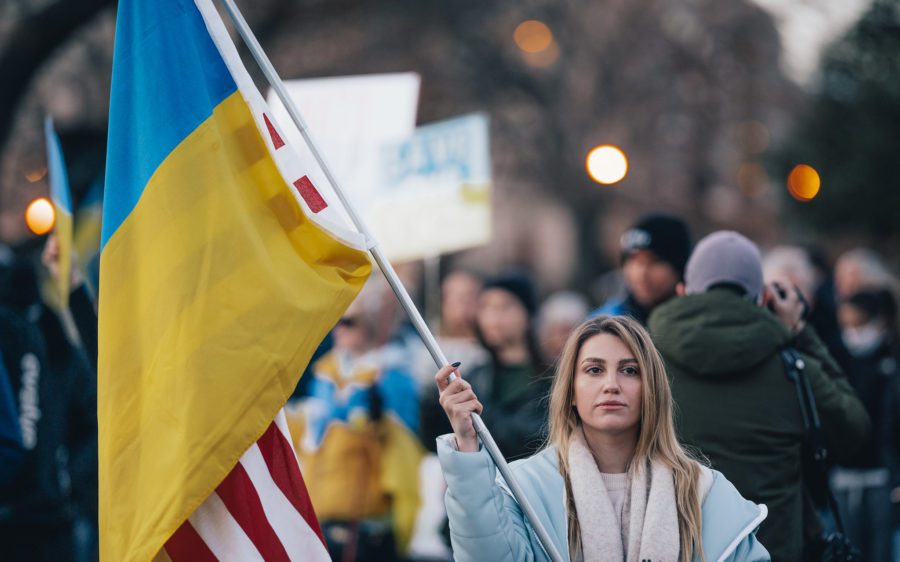At least three banks in Cambodia appear to be blocking aid transfers to Ukraine’s central bank, with one Cambodian bank saying transfers that could fund arms purchases are routinely prohibited.
Calls for donations to Ukraine have continued as the Russian invasion has reached nearly two months. On March 28, Prime Minister Hun Sen condemned Russia for invading Ukraine, calling it an “act of aggression [that] is unacceptable to Cambodia.” The U.N. this week reported more than 4,000 total civilian casualties since the fighting started, while the two militaries have claimed more than 14,000 deaths on each side.
Casey Barnett, an American businessman in Phnom Penh, said he attempted to make a transfer of $2,000 to the National Bank of Ukraine with his ABA account at the end of March, both via a Swift transfer and a debit card transaction. Both were declined. Subsequent attempts to make the same donation via FTB and CIMB banks were also declined, he said.
“With growing signs of genocide and attacks on Ukrainian civilians, I was moved to do my small part to alleviate suffering and help the weak defend themselves against an invasion condemned by the United Nations,” he said.
The NBU’s website offers two links to donate, one for the armed forces and one for humanitarian aid. Both links provide the same account number for donations, though the beneficiary names are “National Bank of Ukraine” and “Ministry of Social Policy for Ukraine,” respectively.
The ABA transcript provided by Barnett lists his transfer attempt as a “Donation to Ukraine for charity purposes,” but he said he was aware the money would support the Ukrainian army.
“I wouldn’t characterize the account for ‘purchase of arms’ but the account is for their armed forces which covers everything from uniforms, meal rations, gas, medicine, ammunition, transport,” Barnett said, adding that relatives in the U.S. had been able to donate to the account via credit card.
He was instead able to transfer funds via FTB to Fondy, a nongovernmental third-party merchant that supports the armed forces. Barnett said the charity purchased night-vision goggles and bullet-proof vests for the Ukrainian army. The website says the charity doesn’t purchase arms, but does provide military equipment.
ABA chief marketing officer Igor Zimarev told this reporter last week that the transfer was blocked because the NBU is associated with donations to fund the armed forces. Funding arms is against ABA’s internal policy, Zimarev said.
“Commercial banks have an exclusion list which doesn’t allow transfers that can be used to buy ammunition, weapons, as well as finance terrorism or human trafficking, for instance. It is a normal practice for banks,” he said.
“Having seen that the payment was sent to NBU, our Compliance stopped the payment, because the receiver and the transaction purpose didn’t match.”
Spokespersons for CIMB and FTB could not be reached despite approaches made this month via social media, listed phone numbers and bank branches.
The National Bank of Cambodia similarly did not respond via email and other channels. The Finance Ministry could not be reached during the New Year holiday period.
Barnett said he was not given a reason from ABA at the time his transfer was declined, while FTB told him in an email that “the function was not available yet.”
Malaysia-headquartered CIMB, meanwhile, told him that Ukraine was on a list of sanctioned countries, which is why his transfer was denied, Barnett said.
“I think there is another level at work here since the payment was rejected by ABA, CIMB, and also FTB. It is a mystery to me. I also tried an ABA Mastercard and that also didn’t work,” he said.
Barnett, who founded the CamEd Business School in Phnom Penh in 1999, added that he was also looking to offer a $50,000 scholarship for a Ukrainian student to study at his school, and had been in touch with the Odessa National Economic University.
“I offered them airfare from any European city that they can get to and to cover their full costs of accommodation and tuition,” he said. “I saw analyst reports saying the war could last for years, so I felt that by studying in Cambodia, they could continue their higher education.”
He also remembered his Cambodian friends who escaped genocide in Cambodia by traveling to study on scholarships, including former CamEd chairman Sam Ghanthy. Ghanthy traveled to Wisconsin to study accounting in 1974 and later earned his doctorate in the U.S.
“He survived because of the scholarship. Eventually, he returned to Cambodia in the late 1990s and supported me in my founding of CamEd. I had him and others like him in mind when I created this scholarship,” Barnett said.













